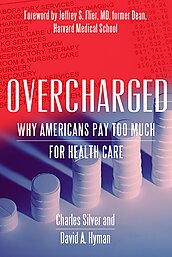Why is America’s health care system so expensive? Why do hospitalized patients receive bills laden with inflated charges that come out of the blue from out-of-network providers or demands for services that weren’t delivered? Why do we pay $600 for EpiPens that contain a dollar’s worth of medicine? Why is more than $1 trillion — one out of every three dollars that passes through the system — lost to fraud, wasted on services that don’t help patients, or otherwise misspent?
Overcharged: Why Americans Pay Too Much for Health Care
Excerpts
Foreword: Read the Foreword by Jeffrey S. Flier, M.D.
Introduction: Read the Introduction Listen to the Introduction
Read two full chapter excerpts:
Chapter 15: Health Care is Expensive Because It’s Insured
Chapter 17: The Retail Sector Will Save Us — If We Let It
Overcharged answers these questions. It shows that America’s health care system, which replaces consumer choice with government control and third-party payment, is effectively designed to make health care as expensive as possible. Prices will fall, quality will improve, and medicine will become more patient-friendly only when consumers take charge and exert pressure from below. For this to happen, consumers must control the money. As Overcharged explains, when health care providers are subjected to the same competitive forces that shape other industries, they will either deliver better services more cheaply or risk being replaced by someone who will.
Praise for the Book
“As CEO of Whole Foods, which spent more than $250 million on health care for our team members last year, I thought I knew how inefficient health care was. Overcharged opened my eyes to how truly dysfunctional America’s health care system has become. This is not capitalism.”
John Mackey
Founder and CEO of Whole Foods
“The biggest threat to America’s prosperity, and even its solvency, is the mismatch between the amazingly and increasingly competent science of medicine and the amazingly and increasingly incompetent pricing and allocation of it. Now come Silver and Hyman to frighten us with the facts, and to point to ways the biggest player in the health care game – the government – can stop making matters worse.”
George F. Will
Pulitzer Prize-winning columnist and author
“Overcharged is a detailed, useful, timely diagnosis of what ails America’s health care system from a free-market perspective. Anyone interested in how to bring health coverage to more Americans — whether agreeing or disagreeing with the author’s view of what ails American health care —will gain greatly from their penetrating analyses of ever facet of the system.”
Michael Hiltzik
Pulitzer Prize-winning business columnist, Los Angeles Times
“Overcharged is just what the doctor ordered. We will be better off if it is widely read and discussed.”
Jeffrey S. Flier, M.D.
Former dean, Harvard Medical School
“Overcharged is a fast‐paced trip through the underbelly of the health care industry, the policies that shape it, and their often undesirable and overly costly results. Silver and Hyman make a powerful case for freeing the system from its government‐created shackles.”
John McClaughry
Founder and vice president, Ethan Allen Institute
About the Authors
David A. Hyman, MD, JD, is an adjunct scholar at the Cato Institute and a professor at Georgetown University Law Center. He teaches or has taught health care regulation, civil procedure, insurance, medical malpractice, law, and economics, professional responsibility, consumer protection, and tax policy. While serving as special counsel to the Federal Trade Commission, Professor Hyman was principal author and project leader of the first joint report ever issued by the Federal Trade Commission and Department of Justice, “Improving Health Care: A Dose of Competition” (2004). He is also the author of Medicare Meets Mephistopheles, which was selected by the U.S. Chamber of Commerce/National Chamber Foundation as one of the top 10 books of 2007.
Charles Silver, MA, JD, is an adjunct scholar at the Cato Institute and holds the Roy W. and Eugenia C. McDonald Endowed Chair in Civil Procedure at the University of Texas School of Law, where he teaches about civil litigation, health care policy, legal ethics, and insurance. His writings on class actions and other aggregate proceedings, litigation finance, medical malpractice, and legal and medical ethics have appeared in leading peer-reviewed journals and law reviews. In 2009, the Tort Trial & Insurance Practice Section of the American Bar Association awarded him the Robert B. McKay Law Professor Award for outstanding scholarship on tort and insurance law.
Twice Bitten
After a brief overnight stay in a local hospital for snake bite treatment, Eric Ferguson was hit with a bill for $89,227. How could this possibly happen? Eric Ferguson tells his story
“Price gouging of incredible magnitude.”
A year after Dr. Paul Davis’s daughter was given a urine test, she received a bill for the test (but never received the results). The cost? Over $17,000. For a urine test? How can a lab charge so much?
Take Advantage of Cato’s Resources
Over the years, Cato has been creating authoritative and innovation information on reforms that would result in higher quality, more affordable, and more secure health care for all. In addition to what you’ll find in Overcharged, Cato’s web site offers a wealth of print and multimedia material on the Affordable Care Act, health care insurance, Medicare and Medicaid, universal health care, drug pricing, the war on opioids, empowering patients, what to expect from health care legislation, empowering patients, and much more.
